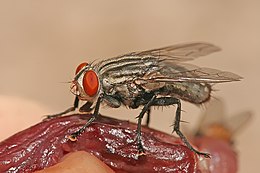
Back Aasdier Afrikaans Carnucero AN قمام Arabic Leş yeyənlər Azerbaijani Мършояди Bulgarian Mrchožrout Czech Ådselæder Danish Aasfresser German Πτωματοφάγος Greek Kadavromanĝanto Esperanto


Scavengers are animals that consume dead organisms that have died from causes other than predation or have been killed by other predators.[1] While scavenging generally refers to carnivores feeding on carrion, it is also a herbivorous feeding behavior.[2] Scavengers play an important role in the ecosystem by consuming dead animal and plant material. Decomposers and detritivores complete this process, by consuming the remains left by scavengers.
Scavengers aid in overcoming fluctuations of food resources in the environment.[3] The process and rate of scavenging is affected by both biotic and abiotic factors, such as carcass size, habitat, temperature, and seasons.[4]
- ^ Tan, Cedric K.W.; Corlett, Richard T. (2011-03-30). "Scavenging of dead invertebrates along an urbanisation gradient in Singapore". Insect Conservation and Diversity. 5 (2): 138–145. doi:10.1111/j.1752-4598.2011.00143.x. ISSN 1752-458X. S2CID 86467187.
- ^ Getz, W (2011). "Biomass transformation webs provide a unified approach to consumer–resource modelling". Ecology Letters. 14 (2): 113–124. Bibcode:2011EcolL..14..113G. doi:10.1111/j.1461-0248.2010.01566.x. PMC 3032891. PMID 21199247.
- ^ Castilla, A.M.; Richer, R.; Herrel, A.; Conkey, A.A.T.; Tribuna, J.; Al-Thani, M. (July 2011). "First evidence of scavenging behaviour in the herbivorous lizard Uromastyx aegyptia microlepis". Journal of Arid Environments. 75 (7): 671–673. Bibcode:2011JArEn..75..671C. doi:10.1016/j.jaridenv.2011.02.005. ISSN 0140-1963.
- ^ Turner, Kelsey L.; Abernethy, Erin F.; Conner, L. Mike; Rhodes, Olin E.; Beasley, James C. (September 2017). "Abiotic and biotic factors modulate carrion fate and vertebrate scavenging communities". Ecology. 98 (9): 2413–2424. Bibcode:2017Ecol...98.2413T. doi:10.1002/ecy.1930. ISSN 0012-9658. PMID 28628191.
© MMXXIII Rich X Search. We shall prevail. All rights reserved. Rich X Search